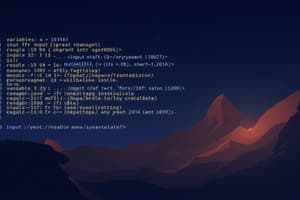Podcast
Questions and Answers
What is the primary purpose of using variables in programming?
What is the primary purpose of using variables in programming?
- To store user interface layouts
- To convert data types automatically
- To represent storage locations in memory (correct)
- To generate random numbers
Which statement correctly defines literals in programming?
Which statement correctly defines literals in programming?
- Literals are values that change during program execution
- Literals are variable names used in calculations
- Literals are constant values assigned to variables (correct)
- Literals represent memory address locations
In the provided program example, what does the statement 'number = 5;' represent?
In the provided program example, what does the statement 'number = 5;' represent?
- Variable conversion
- Variable assignment (correct)
- Variable declaration
- Variable initialization only
What does determining the number and types of variables in a program involve?
What does determining the number and types of variables in a program involve?
Which of the following best describes variable definition in C++?
Which of the following best describes variable definition in C++?
Flashcards
Variable
Variable
A storage location in a computer's memory that can hold a value. It acts like a container for data.
Literal
Literal
A constant value that is written directly into your code and doesn't change.
Assignment
Assignment
The process of giving a variable a specific value.
Program
Program
Signup and view all the flashcards
Determining variable types
Determining variable types
Signup and view all the flashcards
Study Notes
Variables and Literals
- Variables represent storage locations in a computer's memory
- Literals are constant values assigned to variables
- Variables allow storing and working with data in the computer's memory
- Programmers determine the correct number and type of variables needed for a program
- Variables are defined to tell the compiler a variable's name and data type
- Variable definition example:
int number; - The
intkeyword specifies the variable will hold integer numbers only - A variable must be defined before it's used in a program
- Variable definitions can appear at any point in a program
- Assignment operator example:
number = 5; - An assignment operator copies a value from the right side of an equal sign (
=) to a variable on the left - Assignment to a variable doesn't show anything on the screen; instead, it stores a value in RAM
- Printing a variable's value example:
cout << "The value in number is " << number << endl; - This displays the contents of the variable
number - Literals are constant values, which don't change during a program's run
Identifiers
- An identifier is a programmer-defined name to represent program elements, like variables
- Variable names are examples of identifiers
- Choose your own variable names; avoid using C++ keywords
- Identifiers must begin with a letter (a-z or A-Z) or an underscore (
_) - After the first character, use letters, digits or underscores
- Variable names should clearly indicate their use
- Spaces are not allowed in variable names
Data Types
- Variables are classified by data type which determines the kind of information a variable can hold
- Integer variables hold whole numbers only
- If a program uses two integers, length and width, they could be defined separately like this:
int length; int width; - Variables of the same data type can be defined on the same line:
int length, width; - Defining more variables of the same data type on the same line:
int speed, acceleration;
Floating-Point Data Types
- Floating-point data types store real numbers
- Computers use E notation to represent floating-point numbers
Variable Assignment and Initialization
- Assignment operations copy values into variables
- Initialization means assigning a value to a variable during its definition
- Example:
unitsSold = 12;(assigns 12 tounitsSold)
Arithmetic Operators
- Use operators to manipulate numeric values and perform arithmetic operations, such as addition, subtraction, multiplication, division, modulus
- Addition:
+ - Subtraction:
- - Multiplication:
* - Division:
/(integer division will discard remainders) - Modulus:
%(returns the remainder of an integer division)
- Addition:
amount = 4 + 8;(assigns 12 to amount)temperature = 112 - 14;(assigns 98 to temperature)
Comments
- Comments explain or document code.
- Comments are ignored by the compiler
- Single-line comments use two forward slashes (
//) - Multi-line comments start with
/*and end with*/ - Follow good formatting by placing comments well for code readability
Studying That Suits You
Use AI to generate personalized quizzes and flashcards to suit your learning preferences.




